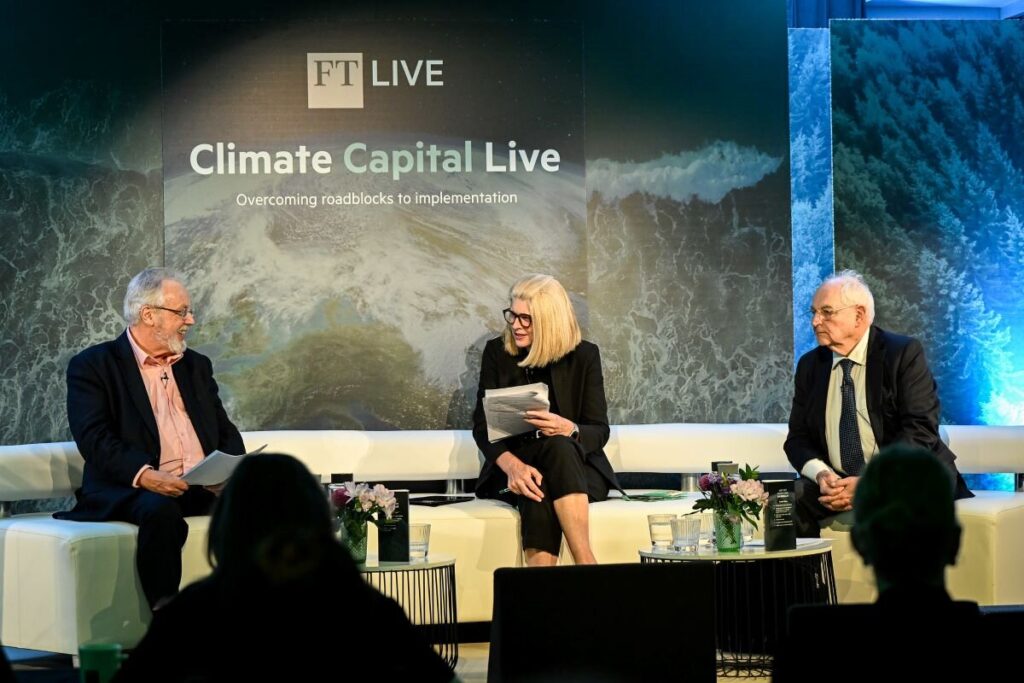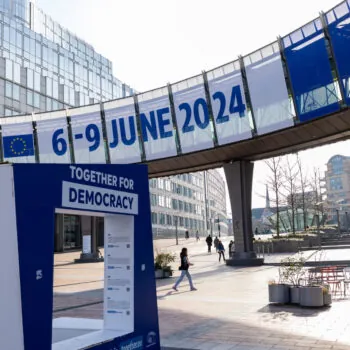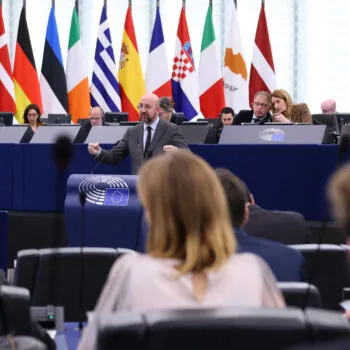E3G Chairman Tom Burke debated Martin Wolf, the Chief Economics Commentator of the Financial Times at an FT Live Conference on Wednesday 13th March 2024. The proposal for this FT New Agenda Debate was that the spread of carbon pricing will set back climate action. Read Tom Burke’s argument for the motion below.

Tom Burke’s excerpt from the FT New Agenda Debate at Climate Capital Live
It is my pleasure to propose that this house believes the spread of carbon pricing will set back climate action.
It is 31 years since nations began the effort to keep the climate safe. In 2015 they agreed that success required the rise in temperature to be kept ‘well below 2.0°C’.
What became clear in Dubai is that climate policy is failing.
Planned production of fossil fuels by 2050 is 150% greater than compatible with 2.0°C.
To remain at 1.5°C emissions must fall 43% by 2030. They will rise by 9%.
Climate policy success requires, in the next three decades, a transformation of the global energy system from one which delivers energy services predominantly by burning molecules to one which provides them by supplying electrons.
The only example from history of this kind of transformation occurred 72 years ago. Between December 1941 and December 1942, the United States transformed its economy from producing white goods and cars to producing tanks and ammunition.
I doubt that anyone thought of suggesting then that the best policy for achieving this transformation would be to put a price on cars and white goods to incentivise the production of tanks and ammunition.
Preventing further climate change fundamentally a security and prosperity imperative not an environmental preference to be addressed by internalising externalities.
Climate policy success requires a globally aligned re-allocation of capital of a magnitude and at a speed for which there is no precedent.
We have yet to grasp three features of a rapidly changing climate.
First, the relentless physics of carbon in the earth system determines the time available to keep the climate safe whatever our other preferences or priorities.
Second, the daily life of all eight billion people on the planet is already being destabilised by climate change. As long as we continue to burn fossil fuels that instability will increase.
Third, the safe climate that has enabled human development throughout history is already vanishing. What we lose we cannot restore.
All the technologies needed to prevent further loss of a safe climate whilst still delivering affordable energy services to everyone are available now.
I am arguing that carbon pricing – a marginal policy tool – cannot bring about the required transformation in capital allocation to deploy those technologies in time. And, furthermore, its current use is already more of a barrier to success than an enabler of success.
A price is put on carbon either by imposing a tax on its use or by trading in the right to burn it.
Both are being tried. Some marginal change is indeed occurring. Neither is driving structural change.
They are failing because carbon prices work better in models than they do in the real world in which their political cost well exceeds their economic benefits.
In last week’s budget the Chancellor failed again to increase the vehicle fuel duty escalator – Britain’s first carbon tax – for the 14th year in a row.
As the Financial Times reported earlier this month, the price of carbon within the European Emissions Trading System last year fell by almost half.
The problem with carbon prices is that they are too weak a signal to investors to drive the necessary scale and speed of capital re-allocation.
Adverse political headlines are a far stronger signal – as we are seeing.
Driving the price of capital down is both a stronger and more reliable signal to investors than driving the price of carbon up.
Climate policy success depends most of all on the speed with which power, transport and buildings can be decarbonised. All require capital intensive, sustained and long duration investment.
High capital investment decisions are driven more by small changes in the price of capital than by larger changes in the cost of inputs.
To deliver climate policy success governments must use public borrowing to drive down the cost of capital for carbon free energy technologies in order to crowd-in the huge flows of available opportunity seeking private capital.
Opportunity seeking is stronger motivator of investor behaviour than by constraint avoidance.
Public skin in the game also counts.
Inappropriate advice from economic theory is misleading governments.
Pricing carbon is a policy tool too economically and politically weak policy to mobilise the required re-allocation of capital for climate policy success in the available time.
The price of capital is a far more powerful tool than the price of carbon.
What is not to like about a public policy tool that drives a price down rather than one that drives a price up?
To reframe James Carvile, it’s the politics stupid.
I beg to move the motion.


